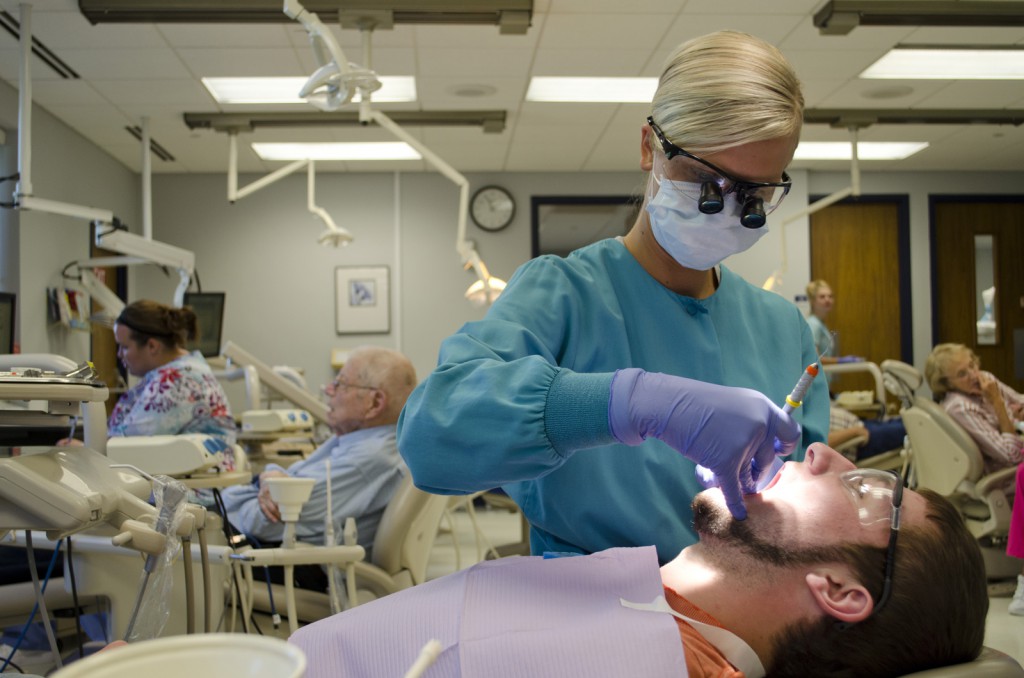Editor’s note: The following article was published in July in Kellogg Community College’s Summer 2012 edition of CareerFocus magazine with the headline, “KCC grads care for you: Clinical experience with community partners leads to higher-quality health care.”
If you’ve ever been sick or injured in Calhoun County, if you’ve ever had your teeth cleaned or an X-ray taken, been transported to a hospital or received physical therapy, chances are good you’ve been cared for by a graduate from Kellogg Community College.
KCC admits more than 200 students into its Nursing Program each year, in addition to 30 Paramedic Program students and nearly 100 students from the college’s Allied Health Career Programs, including Dental Hygiene, Magnetic Resonance Imaging (MRI), Medical Laboratory Technology (MLT), Physical Therapist Assistant (PTA), and Radiography programs.
This is in addition to students enrolled in open-entry programs like the Emergency Medical Technician (EMT), Medical First Responder (MFR) and Nurse Aid Training programs, the latter of which serves more than 400 students per year.
Diana Bonfiglio, director of Allied Health at KCC and supervising dentist over the college’s Dental Hygiene program, said the college’s health-related occupational programs offer students training in fast-growing careers to help fulfill growing needs not only in the community, but in the nation as a whole.
“The opportunity for their education, their clinical experience, is all right here,” Bonfiglio said.
Clinical experience is key for many of the students in such programs to prepare them to enter the workforce, and KCC affords students clinical opportunities in conjunction with dozens of area community partners.
Bonfiglio said the college has a very strong relationship with their clinical sites and hospitals, and with good reason.
“As part of your education, you have to have a certain amount of clinical skills assessments, where you’re learning skills and somebody has to watch you,” Bonfiglio said. “There are requirements from each accrediting body that says you need to learn how to do this, this, this and this. … Students are relying on the clinical sites to get those check-offs.”
Community value
Denise Brooks-Williams, president and CEO of Bronson Battle Creek, a major clinical partner with KCC in affording training opportunities for health students, said the hospital works with more than 100 students per semester from the Nursing Program alone. The hospital also works with students from the radiography and EMT programs.
“We’ve enjoyed years of really positive relationships where we’ve been able to create training opportunities for students in the college,” Brooks-Williams said.
She said the relationship between the college and the hospital is mutually beneficial, assisting students with the learning process while at the same time offering their staff opportunities for mentorship and exposing the hospital system to the top talent of future health professionals.
“There’s an overall community value,” Brooks-Williams said of the partnership. “It’s allowing people in the community that are dedicated to the health profession an opportunity to complete their education. … They’re getting the opportunity to use the skills that they’ve learned in a patient setting.”
Susan Watson, vice president of patient care services at Bronson Battle Creek, said the clinical experience available to health students is crucial.
“It’s part of their learning experience but it also helps them to prepare for when they actually graduate and have to be out there doing this in an orientation and after they’re hired,” she said. “That’s a part of the learning experience you really can’t do without.”
High-quality graduates
Bonfiglio said many of KCC’s health programs are populated through a selective admissions process, meaning they look at applications from a fresh batch of students each year and take only the top students.
This process, in addition to the clinical experience the students receive as part of their education at the college, ensures a crop of high-quality graduates entering the workforce each spring, a fact proven by positive exam success rates.
“Many of the programs require either certification exams or licensure exams, and we’ve traditionally done very well on those,” Bonfiglio said. “Our caliber of students is good and ready to get out there and learn and be out in the workforce.”
Bonfiglio and hospital officials at Bronson agree that the general job outlook for health professions tends to be positive, particularly on a national scale.
“Nationally the health care profession is still very high demand,” Brooks-Williams said. “And a lot of that is tied to the fact that you have an aging population and peoples’ needs or help tend to be delivered by those providers.”
Krista Maynard, a 20-year-old from Belding, is one KCC graduate who benefited from the clinical opportunities offered through KCC and its community partners and is now working in her chosen field.
Maynard – who said her internship at Pennock Hospital in Hastings was her favorite part of her MLT Program studies because it gave her a way to apply everything she’d learned in her lectures – was hired on as a medical laboratory technician at Pennock within two weeks of her graduation this spring.
“I feel like I’m better prepared than some of the students who went through a four-year degree program,” Maynard said. “I’m glad that I made the decision that I did and went to KCC. I’m very happy about it.”
- “Student profile: Dental Hygiene student Keri Slane”
- “Health career programs at Kellogg Community College”
For more information about Kellogg Community College’s Health Career Programs, visit www.kellogg.edu/alliedhealth.
Pictured above, adjunct clinical Dental Hygiene Program instructor Lindsey Farris works on a patient in the Dental Hygiene Clinic on Kellogg Community College’s North Avenue campus. The clinic offers many dental services at reduced rates to members of the public.
